For millions of women living in poverty in India, education is an elusive dream.
For Ather, a 38-year-old single mother living in the state of Telangana, her dream to become a nurse had been present from a young age, like an apparition in the back of her mind that more solidly materialized throughout the seasons of her life, briefly haunting her with visions of what could have been.
The dream was there when she had to drop out of school at age 14 to help tend to her siblings.
It was there a few years later when she got married.
And yet again, it was there as she stumbled under the weight of the responsibility that came with trying to support four children on one meager income.
So, Ather set aside her dream to dream instead for her children.
She focused on fighting to ensure they would have access to the education that she never did — so that they would not have to know what it’s like to live with the heartache of a dream never realized.
That was more than six years ago.
Today, Ather is enrolled in the 10th grade, intent on making up the schooling she missed as a child, and her own dreams are once again at the forefront.
“It is very important to me to get educated because this will be [the] key to my dreams,” Ather said. “I aspire to be a nurse in five years, and to show the world what I can do.”
Thanks to the support of a new scholarship program for mothers in Unbound’s Telangana program, Ather’s once elusive dream — and the dreams of many other Indian mothers like her — is becoming reality.
March 26, 2024 | Scholarship Program
Creating their own destinies
New scholarship program gives Telangana mothers the opportunity for an education
By Kati Burns Mallows
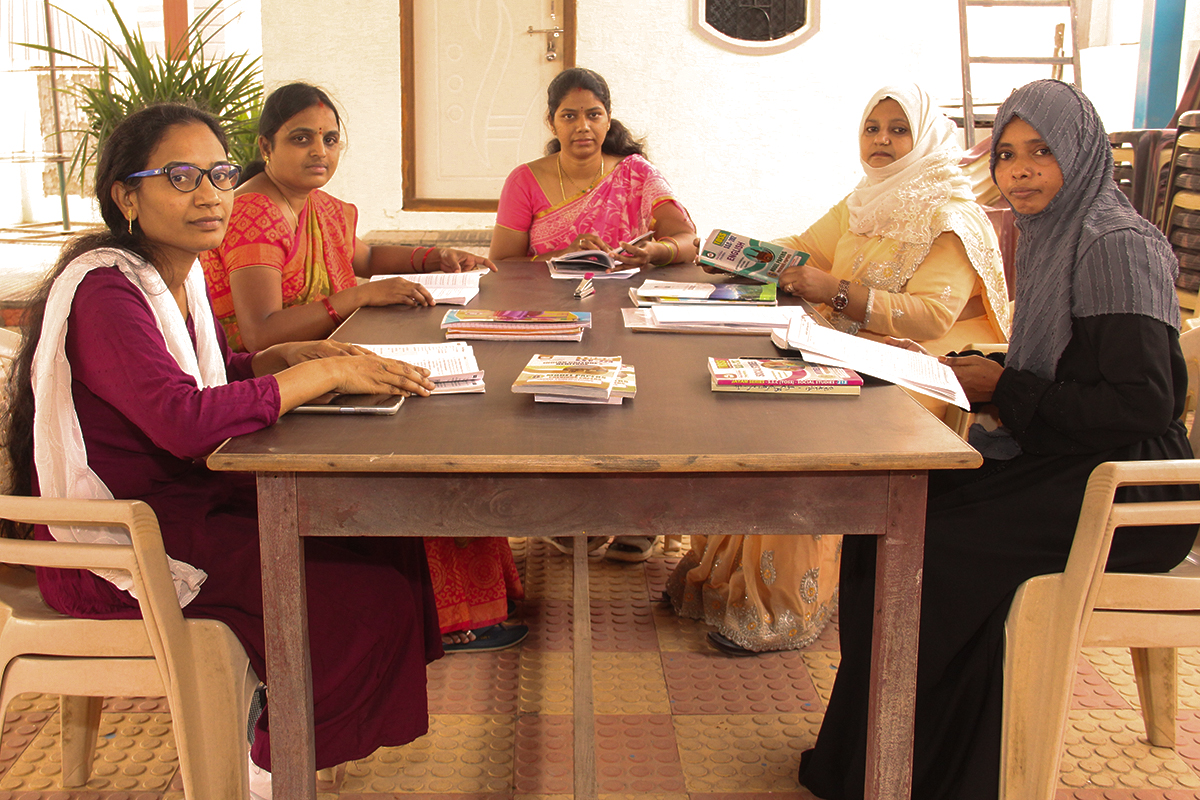
Ather (pictured second from right in cream-colored saree) studies with other mother scholars enrolled in the Unbound Telangana program’s new scholarship program for the mothers of sponsored children in India. Other mother scholars pictured are (left to right) Laxmi, Sravanthi, Devi and Meharunnissa.
Why a scholarship program for mothers in India is necessary
Since the Right to Education Act (RTE) was signed into law in India more than 14 years ago, granting free and compulsory education for all children between the ages of 6 and 14, the country has made great strides in improving access to quality education and increasing school enrollments.
However, educational disparities between men and women are still present today. The literacy rates in Indian women lag behind that of men, with 69% of women literate in 2022 compared with 83% literacy in men. Though the reasons for this are complex and varied, many women end their educations early to help their families with housework, look after siblings or get married.
In Unbound’s Telangana program, these were some of the main reasons for educational disparity staff members heard about from the mothers of newly sponsored children.
Saritha Mendanha, coordinator of Unbound Telangana, said the voices of many mothers were thinly underlined with a deep regret for not being able, against their own wishes, to complete their studies.
“I could hear their silent, ‘I wish …’ with a sigh of sadness and helplessness,” said Mendanha, who has been serving Unbound families in Telangana for 15 years.
“We heard their stories for years, witnessed their knowledge, skills and strengths despite not having formal educations. Their messages were clear — all they were waiting for was the opportunity to fulfill their dreams.”
So, in 2022, in answer to mothers’ grievances, Unbound Telangana staff created a scholarship program just for the mothers of sponsored children.
It isn’t the first time that local staff have worked to create a solution to the issue of women’s inequality. Many of the staff, Mendanha included, grew up in similar environments as the mothers they now work with. In fact, it was in India more than two decades ago that Unbound established its first mothers groups.
The organization’s program model has long supported the conviction that empowered mothers are a force of positive change for their families, communities and in their own lives. In fact, Unbound research has shown that 90% of mothers with sponsored children believe that — with the right support system in place — they have the power to change the lives of their families.
In addition, education has widely been considered as a milestone for women’s empowerment because it equips women and girls to confront traditional roles, change their statuses within both their families and in society, and motivate their own children.
It was to this end that Telangana staff introduced the scholarship program to its first mother scholars, aptly calling it the “Kalala Sakaram Scholarship Program.”
In the Telugu language, “Kalala Sakaram” means “dream come true.”
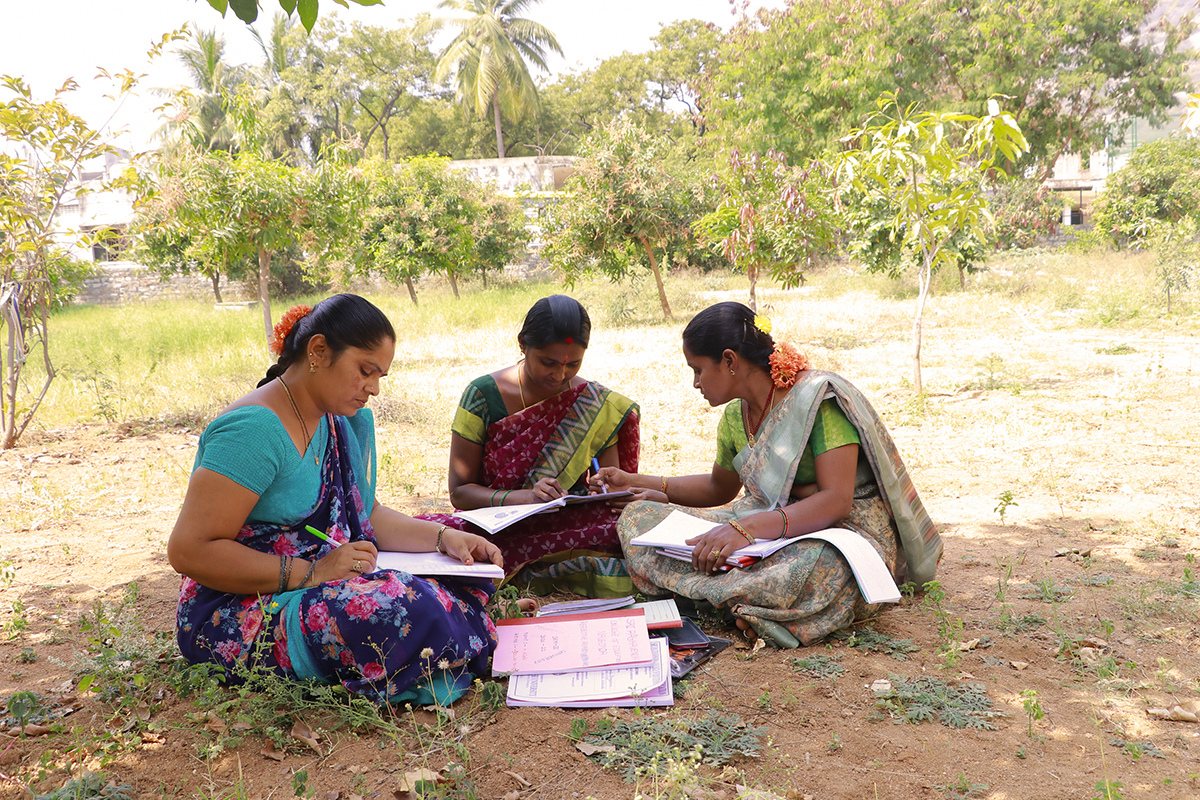
From left to right, Kalala Sakaram Scholarship Program mother scholars Karingu, Nirmala and Sandhya study together near Unbound’s Telangana program office in India.
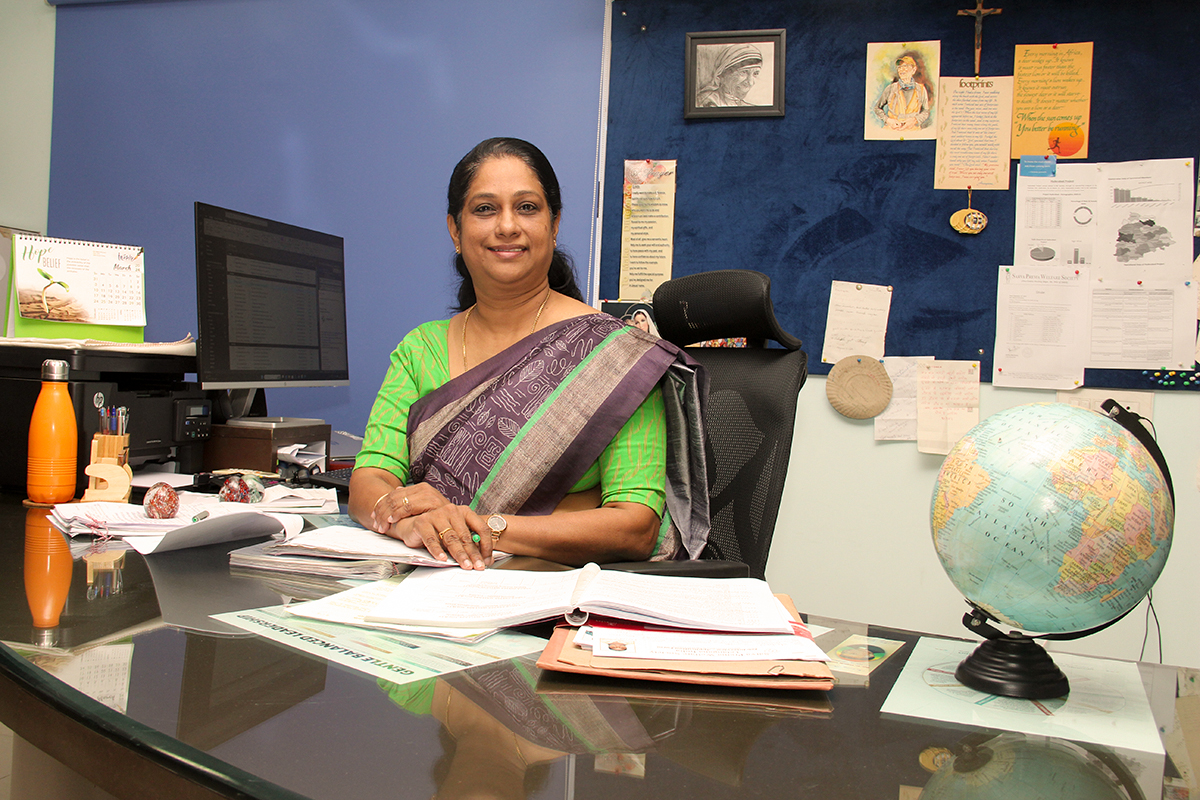
Unbound Telangana coordinator Saritha Mendanha has been working with Unbound families for 15 years and believes the Kalala Sakaram Scholarship Program for mothers will help fill the gap in women’s education.
How the scholarship program for mothers works
Mendanha describes the Kalala Sakaram Scholarship Program as “giving wings to the dreams” of mothers.
So far, 42 mothers are scholars under the new program — 39 are the mothers of currently sponsored children, while three are the mothers of previously sponsored children. Nine of the mother scholars are single mothers.
The Telangana scholarship program for mothers is modeled after the Unbound Scholarship Program that has been in existence since 1998, providing tuition assistance and other study-related costs to promising sponsored or non-sponsored youth for secondary school, vocational training or higher education.
Mothers of current sponsored children and mothers of children who have retired from the program in the last two years are eligible to apply for the Kalala Sakaram Scholarship Program in Telangana as long as they demonstrate a strong focus in goal orientation, one of Unbound’s key program characteristics.
Unlike in the youth scholarship program, mothers in Kalala Sakaram are not required to complete community service hours, and they are given up to two years’ time to obtain passing grades in a course as they learn to adjust their work-life balance to accommodate their studies.
“To be eligible, at a minimum, mothers must have a clear personal goal and a realistic plan to achieve that goal,” Mendanha explained.
Some mothers needed to begin their educational journeys at the basic level, enrolling to complete 10th- or 12th-grade courses in open schooling in Telangana, while other mothers were ready at the outset to pursue higher education or professional studies.
According to Mendanha, the program does not solely aim to increase mothers’ employability in the workforce but is meant to act as encouragement to them to take that next step in their educational journey, to stand alongside their family and community with dignity and lead by example.
“We encourage by reminding them that ‘decisions make destiny’ — with this one decision, they are creating their own destiny,” Mendanha said.
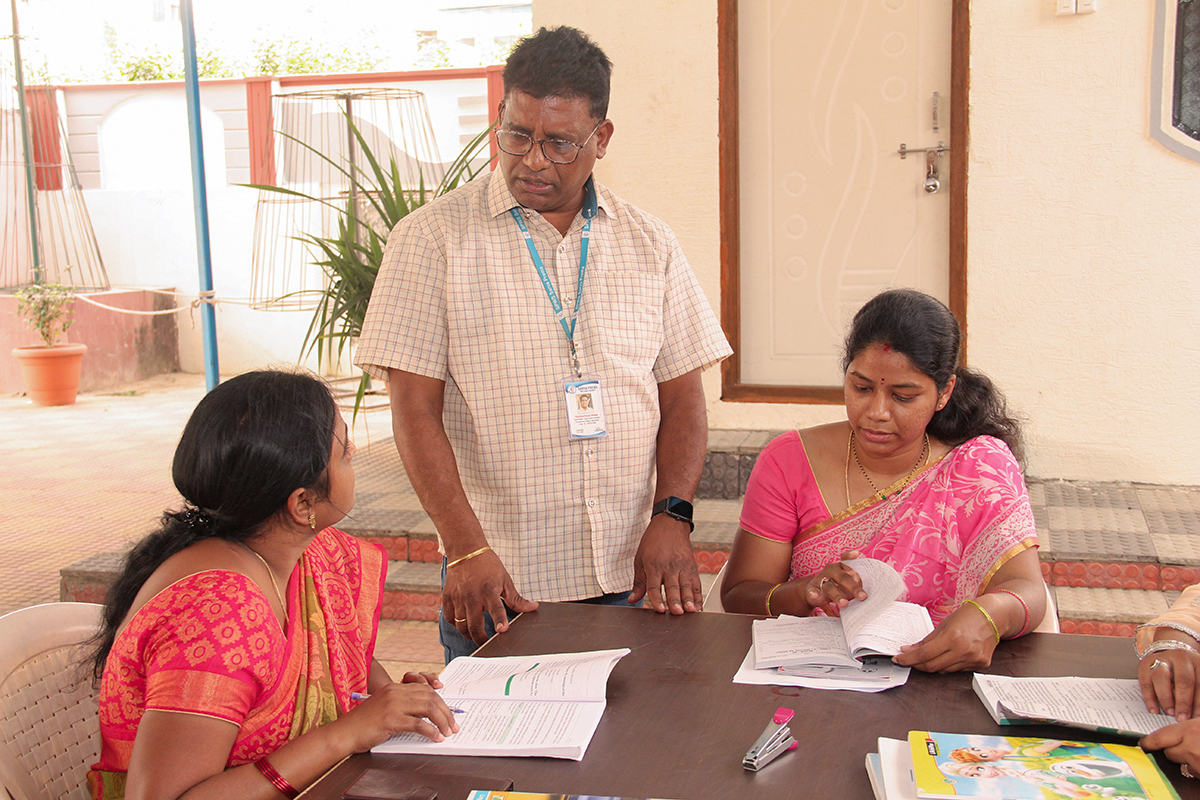
Unbound Telangana program staff member Kaspa Reddy Thumma guides mother scholars Sravanthi (left) and Devi through their study lessons at the Telangana program office in India.
Mothers join their children in creating their own destinies with the scholarship program
Anitha’s goal — and the destiny she is creating for herself — is to become a lawyer.
With the help of the Kalala Sakaram Scholarship Program, the 39-year-old mother of two is in her third year of study, pursuing a degree in law, which she hopes to obtain in 2026.
She arises at 4 a.m. each day to devote two hours to her studies before beginning her household chores.
“My main intention to complete this course is to fight for women’s rights and humanitarian rights in the courts of law,” Anitha said.
Anitha grew up with seven siblings in an Indigenous tribe, and her family moved frequently. That alone would have made consistent education difficult, but she said she also had to contend with the fact that her mother believed education was unnecessary for her children.
Anitha has witnessed the power of education and the doors it can open for her own family. Her daughter, Erra, is a graduate of Unbound’s sponsorship and scholarship programs and now works for Unbound’s Telangana program as a social worker. With the support of Unbound, Erra was able to earn a college degree, something that Anitha takes pride in and was inspired by. Erra was the one who encouraged her mother to enroll in the Kalala Sakaram Scholarship Program.
“Only with education can one reach any status of life,” Anitha said.
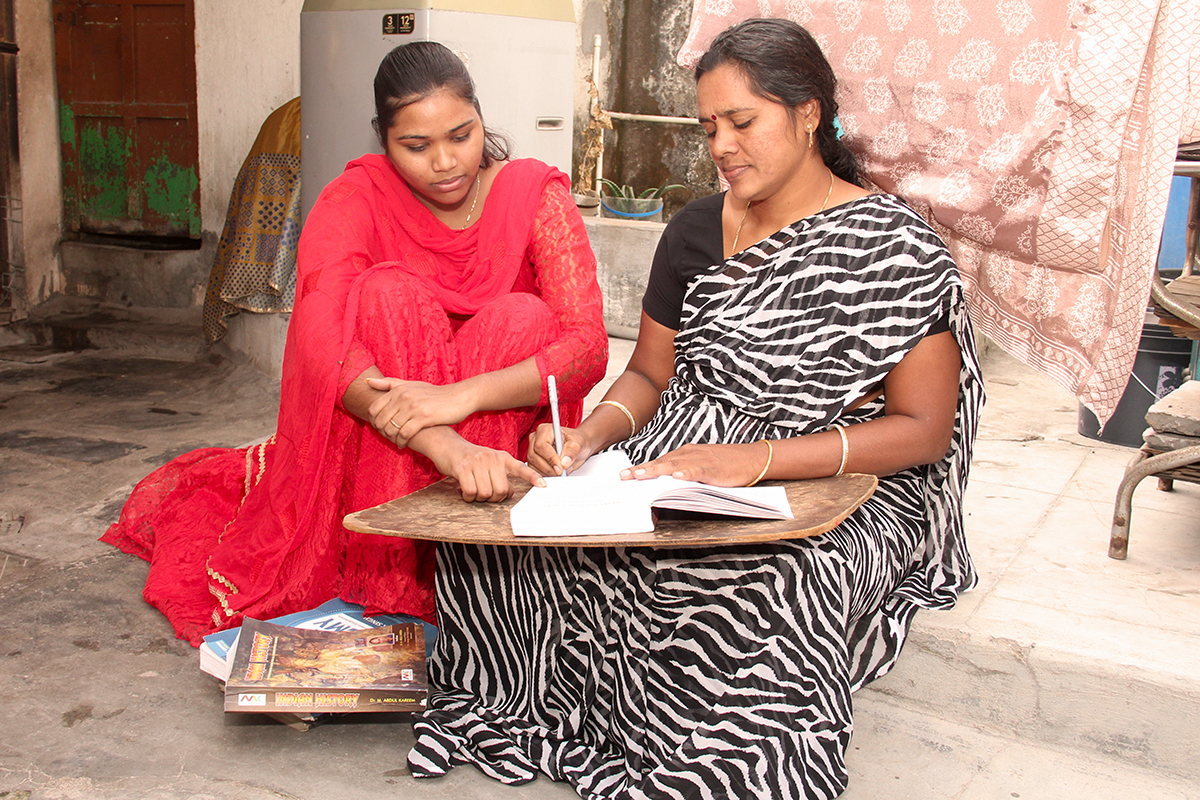
Outside their home in Telangana, India, former Unbound sponsored child and scholarship recipient, 24, helps her mother, Anitha, learn the English language. Through Unbound’s youth scholarship program, Erra earned a bachelor of science in agriculture and now works as a social worker for Unbound Telangana.
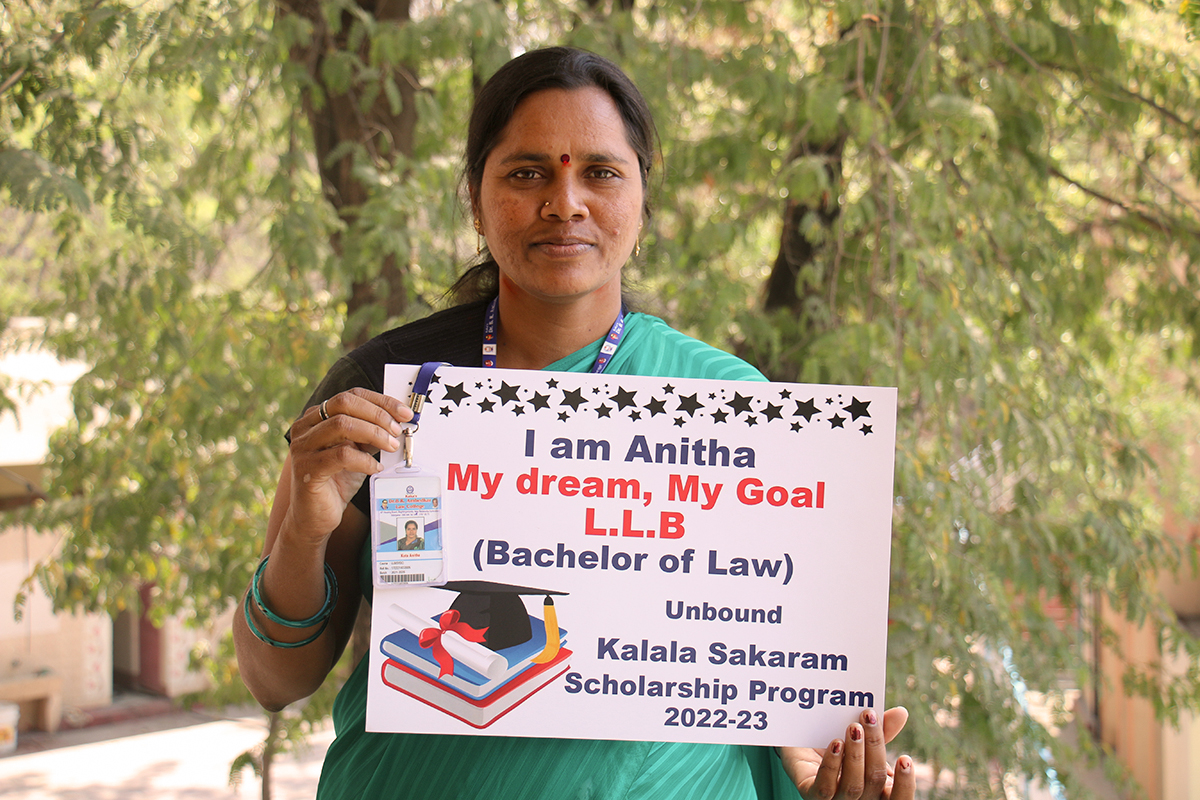
With the encouragement of her daughter, Anitha enrolled in the scholarship program for mothers and is in her third year studying to earn a degree in law.
Four mothers who are scholars in Kalala Sakaram are studying alongside their children who are currently enrolled as youth scholars in the Unbound Scholarship Program.
Bala, 35, and her daughter Sreeja, 17, are two such individuals enrolled in the scholarship program. Bala works as an assistant in a government hospital, helping nurses as they treat patients, cleaning the hospital premises and organizing storage rooms — but she aspires to be a nurse.
Bala was once a sponsored child of Unbound but left the program in her mid-teens after the passing of her father left her mother struggling financially.
“My mother decided to get me married,” said Bala. “I had a dream to study well but because of that, I could not continue my studies. With Unbound again now, I can continue my studies.”
Though schooling on top of her job and household chores makes for early mornings and late nights, Bala is proud she gets to study alongside Sreeja. They help each other with their studies for two hours each night after dinner.
Through Kalala Sakaram, Bala has completed professional training as a multi-purpose health worker and is now studying general nursing at the university on weekends. Her goal is to graduate in 2027. With a degree in nursing, she’ll finally be able to qualify for a permanent nursing position at the government hospital.
“I want to serve the poor, those who suffer from health issues,” Bala said. “With Kalala Sakaram program, I am entering into a respectful life. I will be identified as a qualified nurse and gain respect in the society, family and in the workplace. With my family by my side, I feel so happy and strong.”
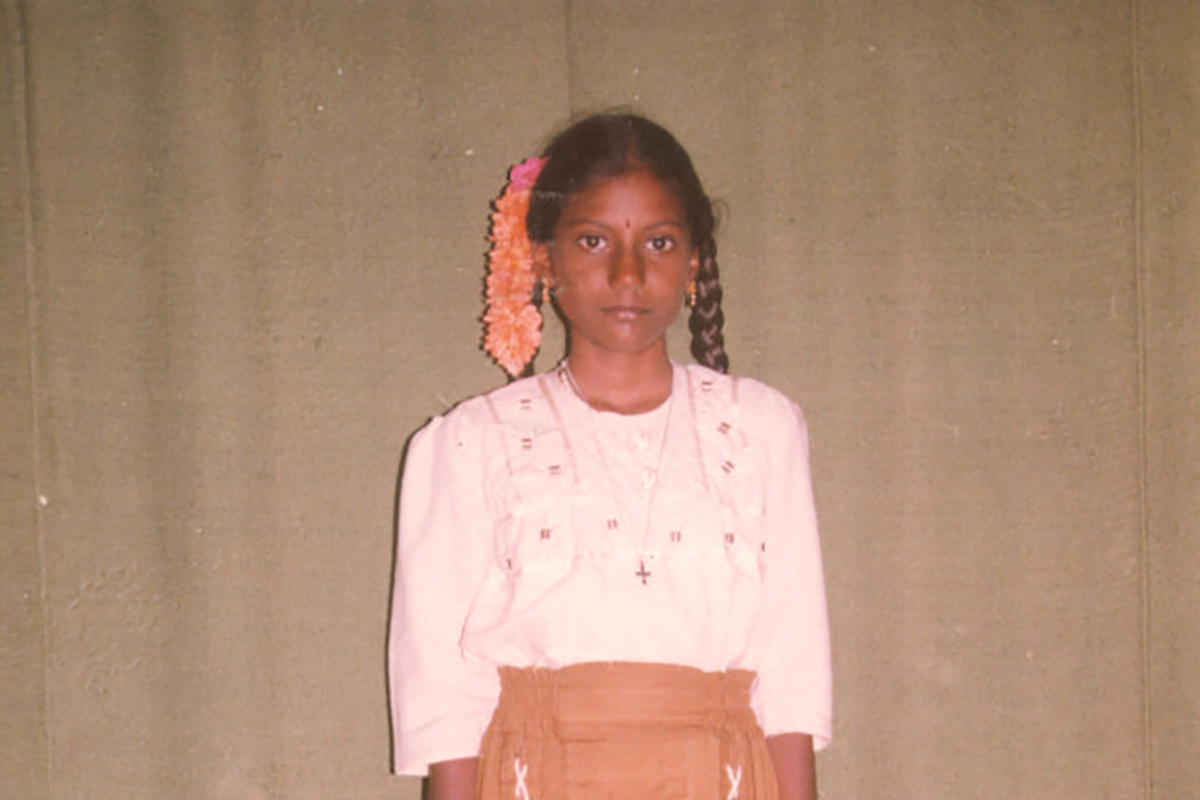
Bala, pictured at age 12, was an Unbound sponsored child between 1996 and 2006 but left the program after the death of her father. Photo from the Unbound archives.
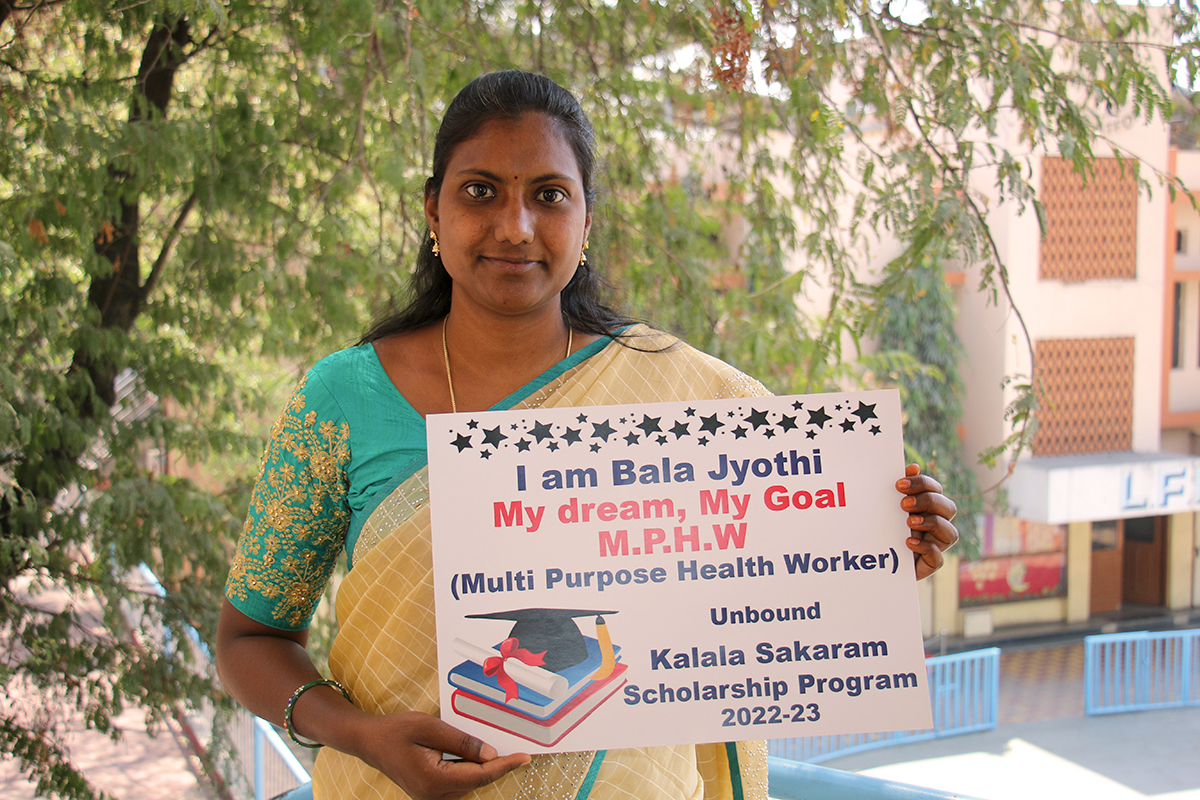
Bala today, at age 35, a mother scholar in Unbound Telangana program’s “Kalala Sakaram Scholarship Program,” which is helping her further her education in the field of nursing.
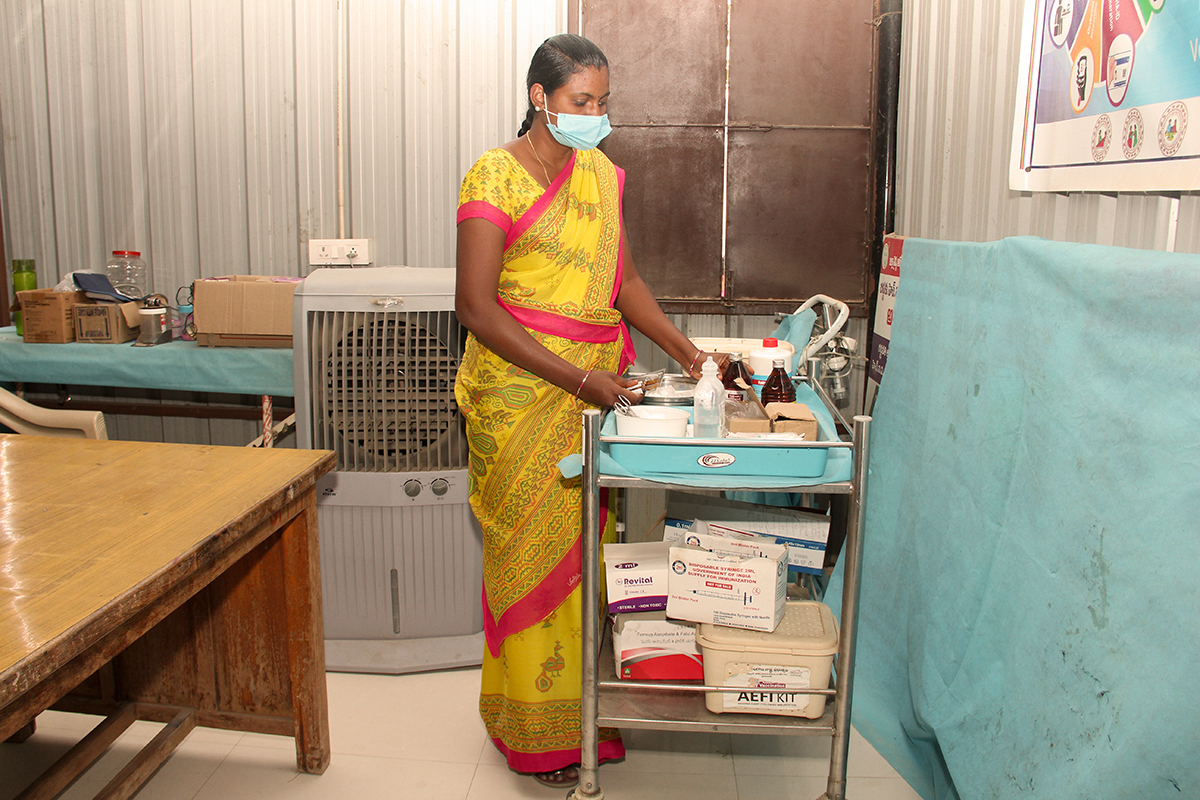
Bala currently works as an assistant in a government hospital in India but hopes to receive a promotion to nurse once she completes her studies in 2027.
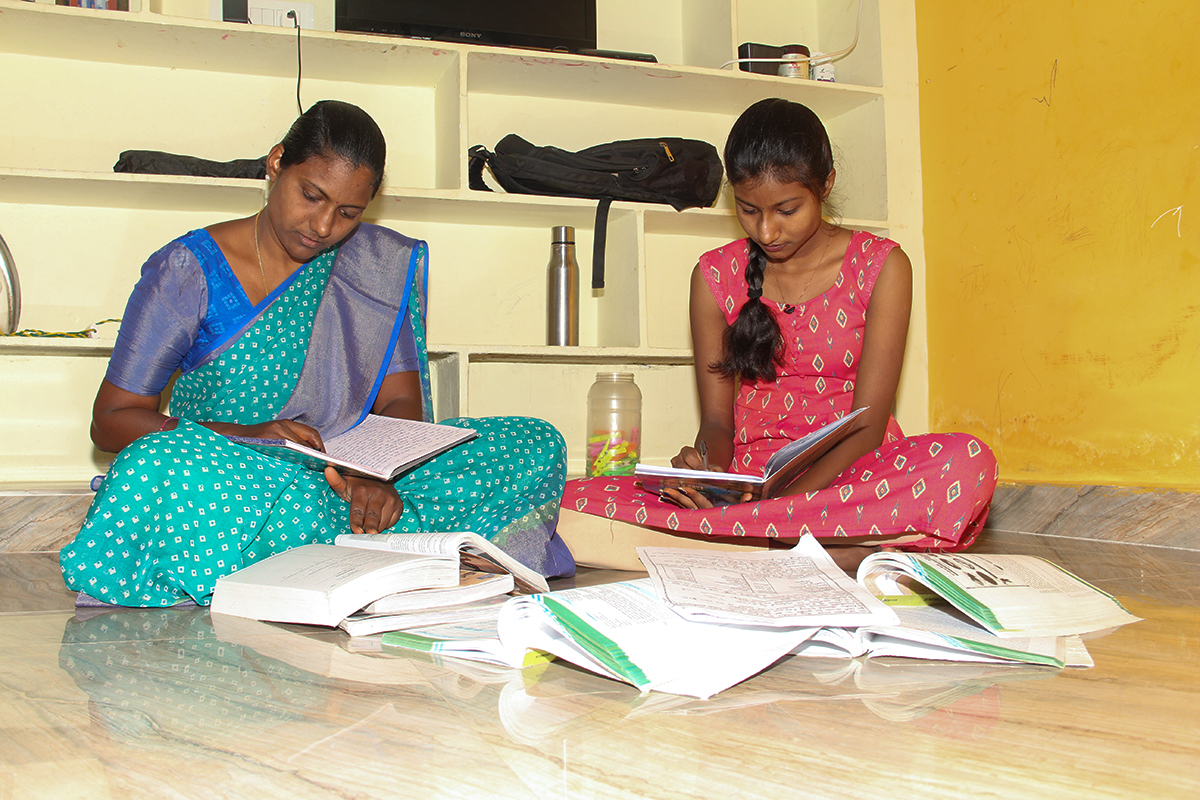
Bala studies nightly alongside her eldest daughter, Sreeja, 17, at their home in India. Sreeja is both a sponsored child and a participant of the Unbound Scholarship Program.
Devi, the mother of 15-year-old sponsored child Shanmukha, also feels the support of her family as she completes her second year of study for a bachelor’s degree in commerce. She studies for exams alongside Shanmukha, and they quiz each other when their subject matter aligns.
Devi, 34, had once dreamed of being a math teacher, but as a youth was only able to complete schooling up to the 11th grade. Though many women in her neighborhood work in factories or as domestic workers or tailors, Devi and her husband were both lucky to find jobs in sales.
Thanks to Kalala Sakaram, with the completion of her bachelor’s degree in one more year, for the first time in her life, Devi will qualify for a promotion at work and a higher salary.
We heard [the mothers’] stories for years, witnessed their knowledge, skills and strengths despite not having formal educations. Their messages were clear — all they were waiting for was the opportunity to fulfil their dreams.
— Saritha Mendanha, Coordinator, Unbound Telangana program in India
Helping close the gap on women's education in India
Since the Kalala Sakaram Scholarship Program launched in 2022, it has served to remind Mendanha that higher education for women is one of the most overlooked means for ending poverty among families. She’s inspired daily by the personal sacrifices, strength, determination and resilience of the mother scholars on their quest to create their own destinies, born of an opportunity they once thought they would never have again.
Thus far, seven mother scholars have fully completed their educations. Two mothers have completed professional courses in general nursing, midwifery and multi-purpose health worker training and are enrolled in college this year. One mother scholar completed pre-primary teacher training, while another earned a master’s degree in library science.
The successes of these first mother scholars of the Kalala Sakaram Scholarship Program have inspired other mothers in Unbound Telangana and their non-sponsored neighbors and friends in their communities.
“It is our hope that our mother scholars and the staff can pave the way for more [mothers] to join [the scholarship program] by helping them eliminate the reasons that are standing between them and their dream of gaining an education,” Mendanha said.
Through the support of Kalala Sakaram, Mendanha believes the mothers of sponsored children will find the confidence they need to take ownership of their development and to eventually lead, not only their families, but their communities toward greater equity and prosperity.
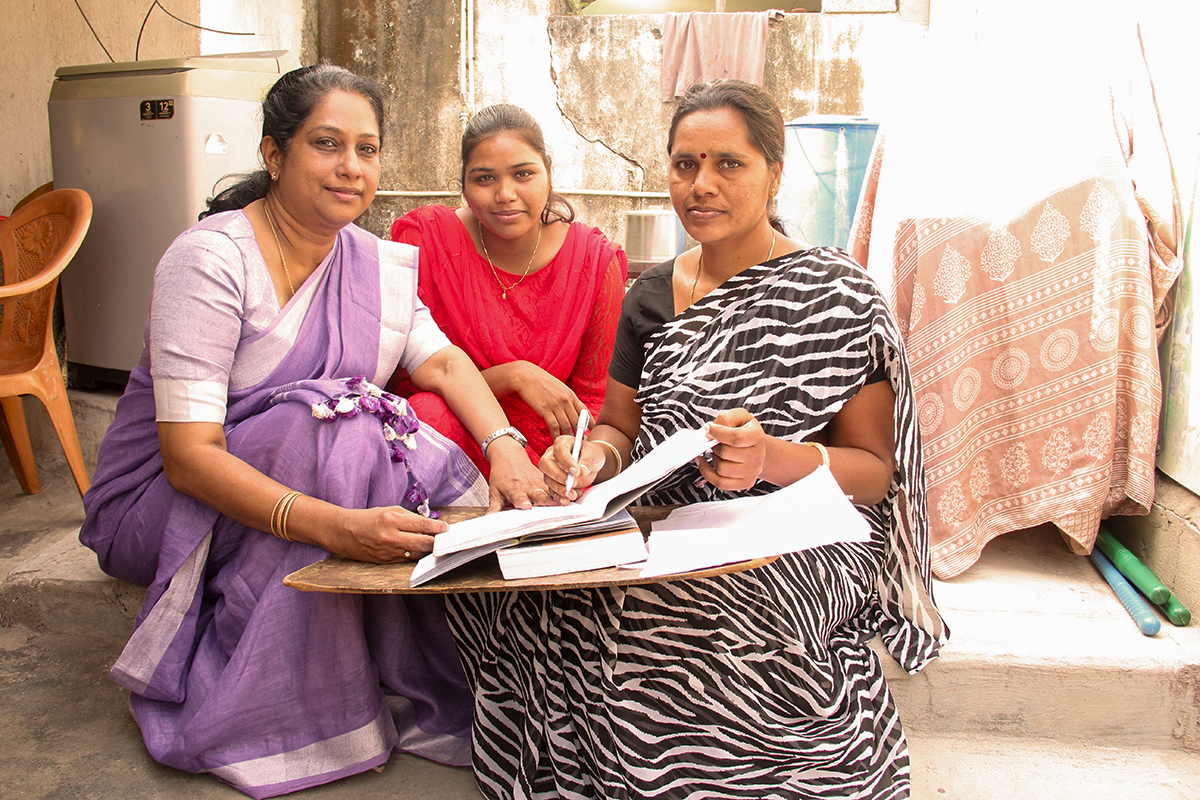
Unbound Telangana project staff Saritha Mendanha (left) and Erra (middle) check in with mother scholar Anitha at her home in India. Anitha, who is Erra’s mother, dreams of earning her law degree so that she can fight for women’s rights in India.